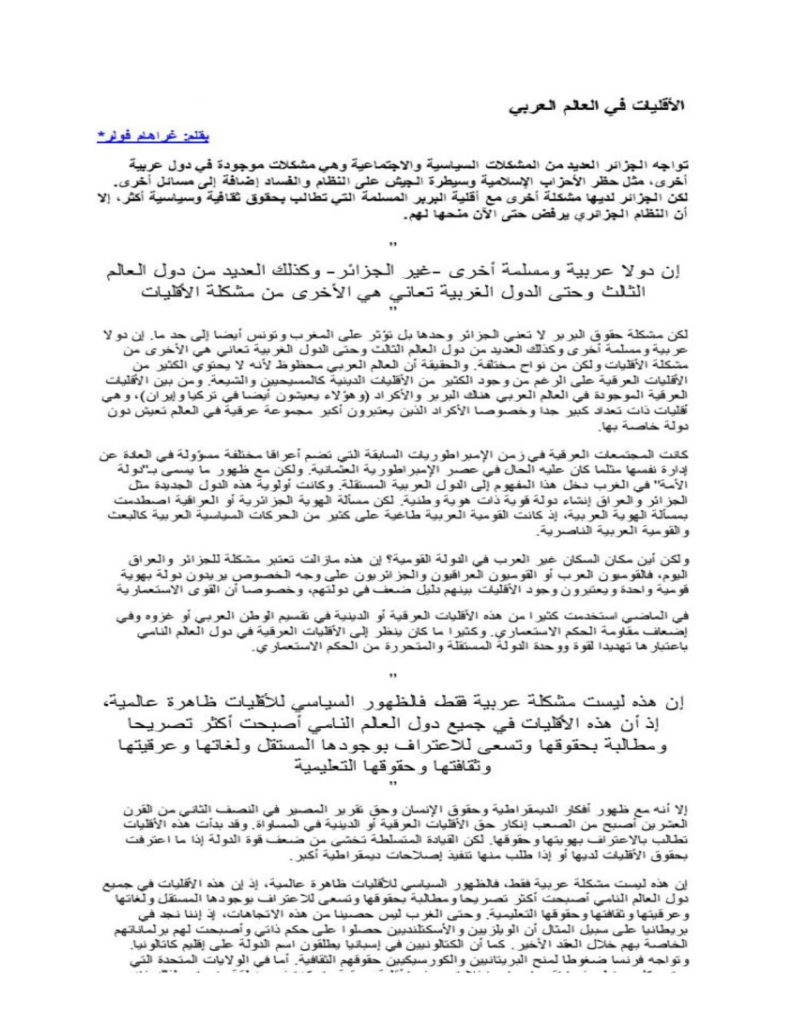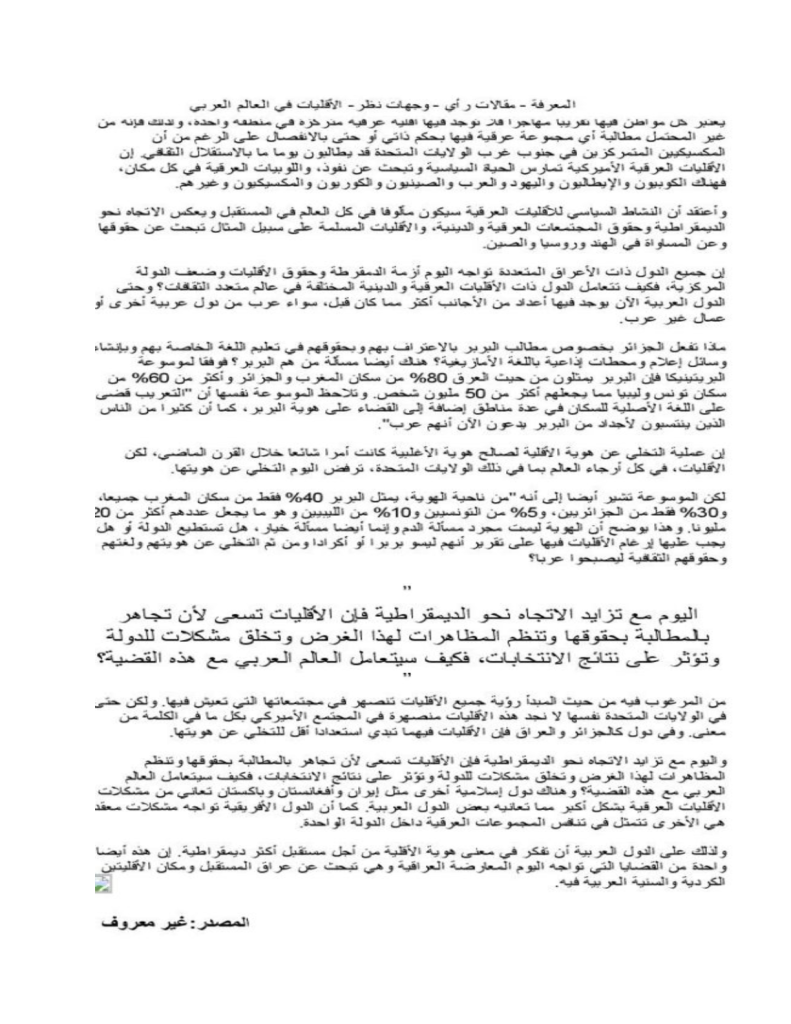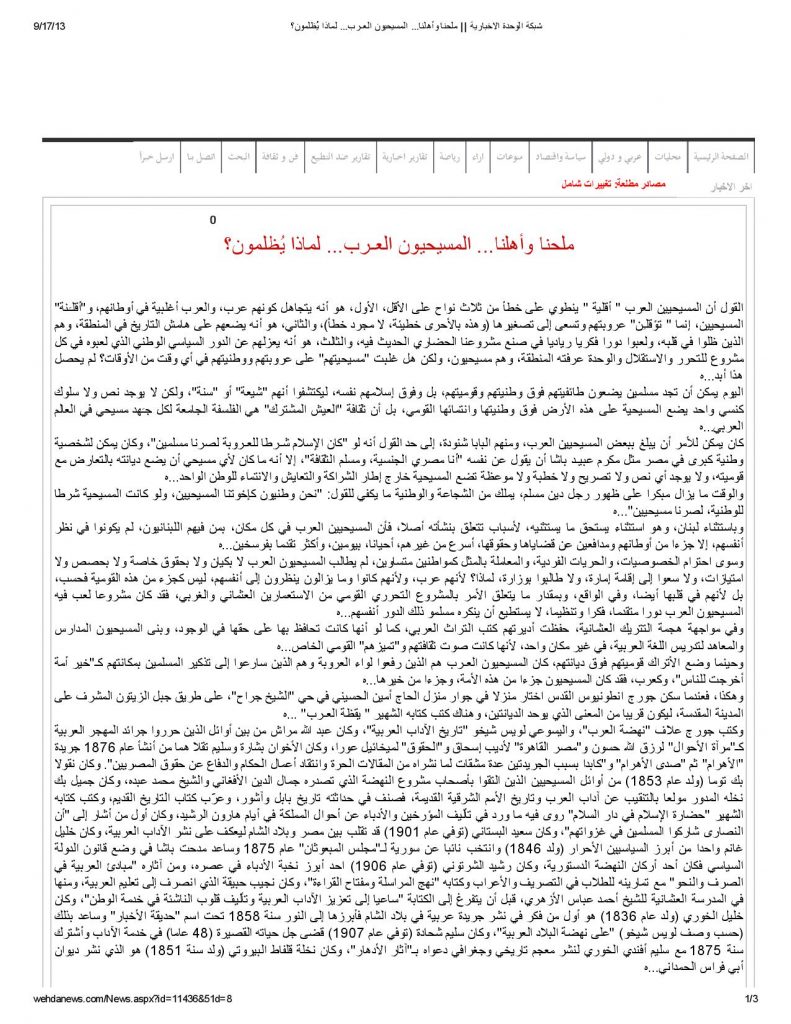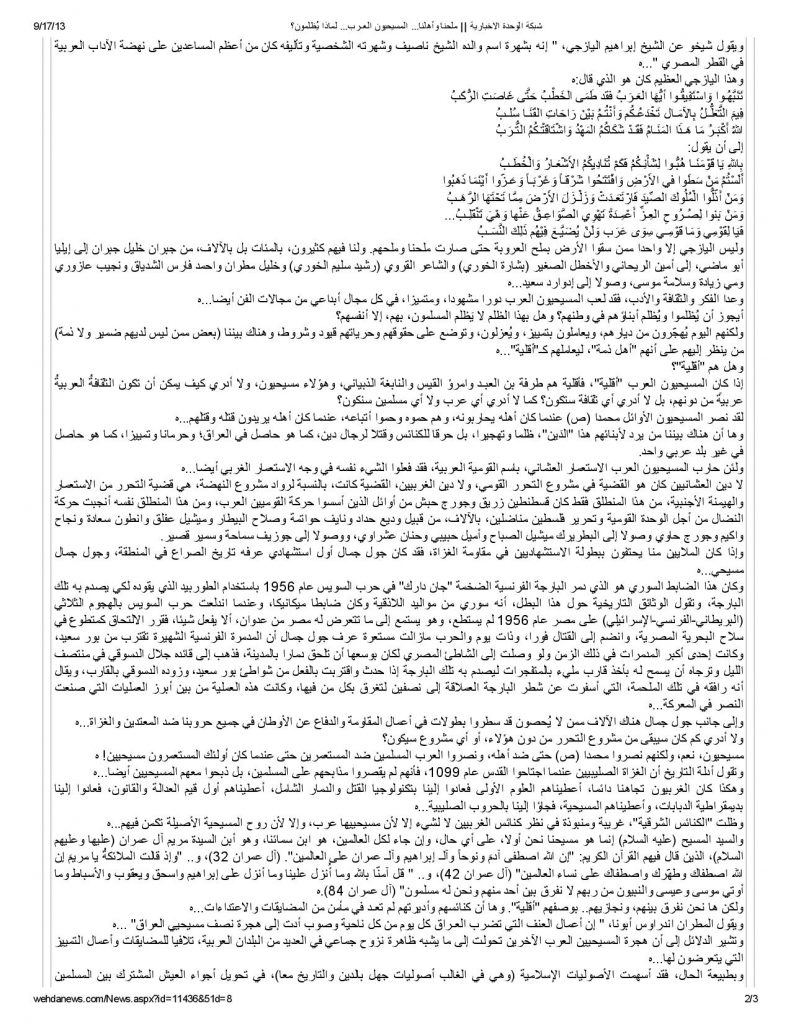









Functions of the Cases وظائف حالات الإسم
By now you have had most of the functions in the three-case system of the Arabic noun. This is a good time to review case functions to help you have systematic control of them and train your nervous system to recognize case functions automatically. Here goes.
- The NOMINATIVE CASE/الأسم المرفوع is well named: its name comes from the Latin word for “name”, nomen. It is the naming case, the case of citations: titles and captions are in the nominative, as are words in lists. Following is a listing of where the nominative case is used:
- titles: ” زيدٌ وكريمة ُ: قصتهما”
- subject of a verb/فاعِل: verbal sentence سافر زيدٌ امس
- subject in a verbless sentence/مبتدأ: زيدٌ من السودان
- predicate in verbless sentence/خبر: زيد طالبٌ في الجامعة
- vocative afterيا، ايها/حرفُ نداءٍ ‘O’: اسمعي يا كريمة ُ Note: as a first term of an idafa the vocative noun takes an accusative case ending: يا بائعة ُ الزهورِ! ‘O seller of flowers’! and an indefinite or unknown addressee is in the accusative indefinite; يا رجلاً! ‘Somebody!’
- noun-prepositionals are inflected for genitive and accusative case but in the nominative case they become adverbs of time and place, like فوقُ ‘above’ and قبلُ ‘earlier’.
A noun in apposition with a nominative noun also is in the nominative case: الرئيسُ زيد
See also predicate ان-clauses, …
- The GENITIVE case/الاسم المخفوض، الاسم المجرور is the simplest: it is used as
- object of preposition: مع زيدٍ and as the
- second term of an idafa/المضاف اليه: أُسرةُ زيدٍ. This includes its use after quantifiers like كل and جميع and prepositionals like بعدَ، عندَ، مثلَ .
A noun in apposition with a noun in the genitive case is also genitive: من اجل الاستا>ِ زيدٍ
- ACCUSATIVE nouns/الاسماء المنصوبةُ serve as
- direct object of verb/المفعول به: ينتج لبنانُ انواعاً مختلفةً من الفواكهِ
- indirect object of verb/المفعول له:من مال اعطت اولادَها كل ما عندها
- predicate of linking verb/خبر: يبدو زيد تعباً اليوم
- predicate or complement of verbal noun: حسبنا زيداً مسافراً ‘we considered Zaid had left/a professor/clever’; اتخذوا القاهرة عاصمةً للدولة ‘they took Cairo as the capital of the nation’
- subject of إن!َ and its sisters: ان زيداً حقاً في حاجة الى مساعدة; ما دُمتُ حياً
- the cognate accusative/المفعول المُطلق: استقبلوهم استقبالاً حارّاً ‘They welcomed them with a warm welcoming’ = ‘They welcomed them warmly.’
- accusative of categorical denial/لا النافية للجنس: لا with an indefinite accusative noun negates the existence of all members of that class of things, “there is no…”: لا مفر!َ ‘there is no escape’; لا بأسَ ‘there is no harm [in it]; لا أحدَ في البيت‘there is no one at home’.
Adverbial modification: almost anything that does not require a nominative or genitive ending will be accusative; this includes
- accusative of time and timing:
noun of time with definite article (= “this”): اليومَ today’, الليلةَ َ tonight’,السنةَ َ ‘this year’ extent of time: سكنا في مدينة الجزائر خمسَ سنين ‘they lived in Algiers five years.’ فَورَ وصولهم ‘immediately on their arrival’; فَوْراً ‘immediately’
- replacing prepositional phrases of time at which: في الليل = ليلاً ‘at night’, عند الظهر ظهراً ‘at noon’, في النهار = نهاراً ‘by day’, في المساء = مساءً ‘evenings’, ً مؤخرا‘recently’
- accusative of place:
acc. indef. nominals signifying “on the…, to the…”, etc.: عالمياً ‘world-wide’, شرقاً وغرباً ‘eastward and westward’
prepositionals in the acc. def.: فوقَ ‘above, over’, تحتَ ‘under’: َحول البيت ‘around the house’
- accusative of extent or degree: ساعتين ‘(for) two hours’, مشوا مئةَ مترا ‘they walked a hundred meters’; غالباَ ‘preponderantly, for the most part’, قليلاً’a little’.
- accusative of purpose or cause: the classic example: قمنا اكراماً له = قمنا لِنُكرمَه ‘we rose to honor him/in his honor’; قال رد!ً على سؤالٍ ‘he said in answer to a question (“to answer a question”): an indefinite accusative verbal noun. طلباً للحرية ‘in search of freedom, searching for freedom’, هرباً من = لِيهربوا من ‘to flee from, in flight from, fleeing from’, خوفاً ‘from fear’.
- specification/تمييز: an indefinite accusative that generally means “with respect to” and deriving from a prepositional phrase (see L. 9): اللبنانيون اقدم العرب تاريخاً في المهجر ‘The Lebanese are historically (= في التاريخ) the oldest Arabs in the diaspora’
- accusative of accompaniment: وَ followed by an accusative noun means ‘together with, with’, as in من جاء وإياك واخاك؟ ’Who came with you and your brother?’ Either وَ or معَ can serve with اتفقas a two-word verb to mean “to reach/be in agreement”. معاً is the adverb “together”.
N.B. Note the use of إي– after the particle وَ- ‘with’, which cannot receive a suffixed pronoun; this suffix is also used for a pronoun direct object of a verb which already has a pronoun indirect object, as inأعطيناهم أياه ‘we gave it to them’ (“we gave them it”).
- after the numerals from “ten” to “nineteen” plus the tens: the counted noun is accusative singular indefinite: اثنا عشر كتاباً ‘twelve books’, واحد وثلاثين يوماً ‘thirty-one days’
Particular constructions/ جلسوا متأملينَ اخبارذلك اليوم وهم يتأملون ‘they sat contemplating the news of that day’ = ‘as they contemplated’
- the quality or feature being compared in a comparative construction/اسم التفصيل:
زيد اصغر منه سناً واكبر منه عقلاً ‘Zaid is younger than he is (in years) and older in intelligence.’
- accusative indefinite singular complement of كَم ‘how much? how many?’:تريد؟ كم ديناراً ‘how many dinars do you want?’; كم نهراً؟ ‘how many rivers?
- accusative of admiration: a definite accusative noun follows ما plus a Form IV verb based on a qualitative root gives the meaning “how…is…!”, as in ما اصعبَ ا الدرسَ ‘how hard this lesson is!’, based on the root of صعب ‘difficult’; ما اجمل لبنانَ ‘how beautiful Lebanon is!’
- vocative noun as second term of an idafa: ما`l ماذا تفعل يا عبدَ الله؟ ‘what are you doing, Abdullah?’
**********
Apposition: nouns in apposition take the same case as the noun they are in apposition with:
وصل امس من الشام زيدٌ اخو كريمةَ
هل تعرف زيداً أخا كريمةَ؟
تحدثوا الى زيدٍ اخي كريمةَ
Grammar اسم المفعول
Passive Participles. In the previous lesson we discussed active participles; it would be well now to have a glance at passive participles, first the forms and then their usages.
Form I verbs were presumably the original verbs in Arabic, and the derived verb conjugations were built on them. For example, Form I verb وضُحَ ‘to be clear’ can be put into the causative Form II verb وضح to mean “to cause to be clear, make clear, clarify, explain.’ Form I active participles have their own private shapes different from those of the derived Forms. The Form I active participle pattern is فاعل and its variants, as you know (see…), and the passive pattern is مفعول, as in فاعل ‘making’ and مفعول ‘made’ from فعل – يفعل ‘to do, make’. Some non-canonical illustrations of Form I active participles are كبير ‘big’, حَسَنٌ ‘good’ and تَعْبانٌ ‘tired’.
The rule for forming all the derived verb participles goes like this, illustrated by Form II قد!م ‘to present; to offer’, Form VI تناوَل ‘to reach for and take’ and VIII انتخب ‘to elect’:
0: Imperfect indicative: يقدِم يتناوَل ينتخِب 1. Select the imperfect stem: -قدِم -تناوَل نتخِب –
- Prefix مُ-: مقدِم متناوَل منتخِب
- Change the stem vowel
for the active to i: مُقدِمٌ’presenting’ متناوِل ‘taking up’ منتخِب ‘electing’
for the passive to a: مُقدَم ‘presented’ متناوَل ‘taken up’ منتخَب ‘elected’
The meaning of the passive participle is “having undergone the action of the verb” or “having been put into the state or quality denoted by the verb”; the technical term for this meaning is patient, one who has suffered or undergone the action of the verb. Thus the underlying meaning of مقدَم is ‘having been presented’, of متناوَل is ‘having been taken’, and of منتخَب is ‘having been elected’.
The passive participles of verb-preposition idioms retain the preposition to specify the meaning of the phrase; the structure is illustrated by the following phrase based on وَثِقَ – يَثِقُ بِ ‘to trust, have confidence in’:
دراسةٌ موثوقٌ بها ‘a trustworthy/reliable study’
The past participle itself is invariable–it is always masculine singular, while the pronoun object of the preposition is what agrees with the modified noun. Here are a two more examples:
القوانين المعمول بها ‘the laws on the basis of which (governments) have been operating’
علمه وجهده غير مرغوبٍ فيهما في وطنه الام’his education and efforts are not favored in his mother country’
A secondary meaning of the passive is potentiality of action; for example, مأكول can mean either ‘(having been) eaten’ or ‘edible’ and مقبول can mean ‘accepted’ or ‘acceptable’. This feature is found in the verb as well, where the passive can have potential meaning, as in شيء لا يُصدقُ ‘something unbelievable (“not to be believed”)’ and لم يحدثْ شيءٌ يُذكَرُ ‘Nothing remarkable happened.’
Finally, some passive participles develop fixed meanings and become nouns, taking the plural patterns that nouns rather than adjectives take, like مكتوب ‘message, note’ (“that which has been written”) with its plural مكاتيبُ and مفهومٌ – مفاهيمُ ‘notion-s, concept-s’. The word معلوم is interesting: as a passive participle it means “known”; as a noun it means “fee; duty, tax”, and with the feminine suffix, معلومة, it means ‘a known or given fact’ and has the regular plural معلومات meaning ‘knowledge, information; data’.
Derived passive participles may also mean noun of place, like مخي!َم ‘camping ground, camp’ from خيم ‘to pitch tent, encamp’ and مُستشفىً ‘hospital’ from استشفى ‘to seek a cure’. In this usage the derived passive participles differ from basic Form I verbs, which have the special pattern مفعلة/مَفعَل (or مفغِل with most verbs whose imperfect stem vowel is i). The plural of all of these patterns is مَفاعِلُ.
مكتبٌ – مكاتِبُ ‘office-s’ from كتب – يكتُب ‘to write’
مدرسةٌ – مدارسُ ‘school-s’ from درس – يدرُس ‘to study’
مجلِسٌ – مجالسُ ‘seat; session; council’ from جَلَسَ – يجلِس ‘to sit down’
مقهىً – مقاهٍ from the root of the noun قهْوة ‘coffee’
بعض الظروف الشبيهة بالأسماء ‘Prepositionals’
In addition to true prepositions like في ، مِن ، بِ، الى , Arabic uses words in the accusative, which are originally nouns, followed by nouns in the genitive, as prepositions of time and space; some are even preceded by one or more of the basic prepositions. We already know a great many of them: عندَ، أمامَ، وراءَ، قـُدّامَ، وراءَ، خـَلـْفَ، بـَدَلَ، رَغـْمَ، دونَ ، أثـْناءَ، وَسـْطَ ، نـَحـْوَ، بـَيْنَ الخ . قبلَ ، بعدَ، . Others occur in this lesson and you will be encountering some more in the course of further reading and exposure. All of these are high frequency items and need to be learned and used. Here are some more of these high frequency compound prepositions; the list on the right provides those that appear without a primary preposition, and the one on the left those that do :
جـِوارَ = بِجِوارِ ‘next to, beside’ عـَبـْرَ ‘across, over, on the other side’
جـَنـْبَ =بـِجانـِبِ ‘ near, next to’ تـُجاهَ ‘facing, in front of, opposite’
قـُرْبَ ه=بـِقـُرْبِ ه=بالقـُرب من تـِلـْوَ ‘after, after’
خـِلافَ = بـِخـِلافِ ‘apart from, aside from, contrary’ طِوالَ/ طيلة َ ‘during, throughout a period of time’
إزاءَ = بإزاءِ ‘facing, face to face with’ ضـِد ّ ‘against’
عـَقـِبَ =على عـَقـِبِ ‘subsequent to, immediately after’ لـِقاءَ ‘in return for’
‘according to, depending on, in accordance with’ نحوَ ‘towards’
إثـْرَ= على إثرِ ‘right after, immediately after نُصْبَ ‘facing, in front of’
حـَولَ = من حـَول ِ ‘around, about’ رَهـْنَ ‘pending, depending on, subject to
حـِيالَ =بـحـِيال ِ ‘with regard to, in view of’ صَوْبَ ‘in the direction of, toward’
حـَولَ = من حـَول ِ ‘around, about’
من حـَوْلَيـَهما ‘around the two of them’
ضـِمـْنَهم = من ضِمـْنِهم ‘inside of, in, among’
اثناء َ = في أثناء ‘during’
ضِمْنَ = من ضمنِ ‘included in, implied in
وَفْقَ = من وفق = وفقا ً لِ
عِوَضَ = عوضا ً عن/من ‘instead of, as a substitute
‘according to, in conformity with
حـَسـَبَ =بـِحـَسَبِ =على حـَسَبِ
‘according to, depending on, in accordance with’
Some of these prepositionals likeوفور حالَ occur followed by مصدر . In the case of حالَ the مصدر can be صريح ‘verbal noun’ or مؤوّل ‘nominalized clause’. Here are the forms in which they are found.
حالَ
حالَ (وصولِه)=حالما وصل ‘immediately upon’
حالا ً=في الحال=للحال ‘at once, without delay, immeditely’
على كلّ حال=على أيّ حال ‘in any case, at any rate’
على حاله ‘just as it is’
فَور
فـَورَ (وصوله) ‘immediately after (his arrival)’
فورا ً=على الفـَور ِ ‘immediately, right away’
من فـَوْرِ(ه) ‘at once, forthwith, promptly’
Abstract nouns/الاسماء المجردة. Concrete nouns refer to something tangible, something you and hold or touch; abstract nouns are things that have no physical shape and that you cannot touch and that do not refer to a specific object, like ideas and concepts, feelings, names of qualities, etc. (One person defined “abstraction” as something that cannot be colored.) Since an abstraction covers all instances of the item there should not be need for a plural; if you do see an abstract noun pluralized then you have a new word with a new meaning, a vocabulary item. For example, “life” in “All life is precious” is an abstract noun referring to all human’s and to all living things but the plural form in the title of Francis Yeats-Brown‘s “The Lives of a Bengal Lancer” has been lexicalized and now means tales from the life of an individual. You learned in Lesson 7 that the definite article ال used with a singular noun may denote a genus or class of nouns, a kind of abstract noun called a generic noun. Another very common abstraction in Arabic is formed with the suffix ِيةٌ-, which corresponds to English abstract suffixes like –ty in “civility”, “nicety” and “gravity”; ‑dom in “freedom” and “kingdom”; –ness in “goodness” and “oneness”, etc. In this lesson we have المسيحيةُ ‘Christianity’ which is based on المسيح ‘(the) Christ’.
Functions of the Cases وظائف حالات الإسم
By now you have had most of the functions in the three-case system of the Arabic noun. This is a good time to review case functions to help you have systematic control of them and train your nervous system to recognize case functions automatically. Here goes.
- The NOMINATIVE CASE/الأسم المرفوع is well named: its name comes from the Latin word for “name”, nomen. It is the naming case, the case of citations: titles and captions are in the nominative, as are words in lists. Following is a listing of where the nominative case is used:
a. titles: ” زيدٌ وكريمة ُ: قصتهما”
b. subject of a verb/فاعِل: verbal sentence سافر زيدٌ امس
c. subject in a verbless sentence/مبتدأ: زيدٌ من السودان
d. predicate in verbless sentence/خبر: زيد طالبٌ في الجامعة
e. vocative afterيا، ايها/حرفُ نداءٍ ‘O’: اسمعي يا كريمة ُ Note: as a first term of an idafa the vocative noun takes an accusative case ending: يا بائعة ُ الزهورِ! ‘O seller of flowers’! and an indefinite or unknown addressee is in the accusative indefinite; يا رجلاً! ‘Somebody!’
f. noun-prepositionals are inflected for genitive and accusative case but in the nominative case they become adverbs of time and place, like فوقُ ‘above’ and قبلُ ‘earlier’.
A noun in apposition with a nominative noun also is in the nominative case: الرئيسُ زيد
See also predicate ان-clauses, …
- The GENITIVE case/الاسم المخفوض، الاسم المجرور is the simplest: it is used as
a. object of preposition: مع زيدٍ and as the
b. second term of an idafa/المضاف اليه: أُسرةُ زيدٍ. This includes its use after quantifiers like كل and جميع and prepositionals like بعدَ، عندَ، مثلَ .
A noun in apposition with a noun in the genitive case is also genitive: من اجل الاستا>ِ زيدٍ
- ACCUSATIVE nouns/الاسماء المنصوبةُ serve as. a.
a. direct object of verb/المفعول به: ينتج لبنانُ انواعاً مختلفةً من الفواكهِ
b. indirect object of verb/المفعول له:من مال اعطت اولادَها كل ما عندها
c. predicate of linking verb/خبر: يبدو زيد تعباً اليوم
d. predicate or complement of verbal noun: حسبنا زيداً مسافراً ‘we considered Zaid had left/a professor/clever’; اتخذوا القاهرة عاصمةً للدولة ‘they took Cairo as the capital of the nation’
e. subject of إن!َ and its sisters: ان زيداً حقاً في حاجة الى مساعدة; ما دُمتُ حياً
f. the cognate accusative/المفعول المُطلق: استقبلوهم استقبالاً حارّاً ‘They welcomed them with a warm welcoming’ = ‘They welcomed them warmly.’
g. accusative of categorical denial/لا النافية للجنس: لا with an indefinite accusative noun negates the existence of all members of that class of things, “there is no…”: لا مفر!َ ‘there is no escape’; لا بأسَ ‘there is no harm [in it]; لا أحدَ في البيت‘there is no one at home’.
Adverbial modification: almost anything that does not require a nominative or genitive ending will be accusative; this includes
h. accusative of time and timing:
noun of time with definite article (= “this”): اليومَ today’, الليلةَ َ tonight’,السنةَ َ ‘this year’ extent of time: سكنا في مدينة الجزائر خمسَ سنين ‘they lived in Algiers five years.’ فَورَ وصولهم ‘immediately on their arrival’; فَوْراً ‘immediately’
i. replacing prepositional phrases of time at which: في الليل = ليلاً ‘at night’, عند الظهر ظهراً ‘at noon’, في النهار = نهاراً ‘by day’, في المساء = مساءً ‘evenings’, ً مؤخرا‘recently’
j. accusative of place:
acc. indef. nominals signifying “on the…, to the…”, etc.: عالمياً ‘world-wide’, شرقاً وغرباً ‘eastward and westward’
prepositionals in the acc. def.: فوقَ ‘above, over’, تحتَ ‘under’: َحول البيت ‘around the house’
k. accusative of extent or degree: ساعتين ‘(for) two hours’, مشوا مئةَ مترا ‘they walked a hundred meters’; غالباَ ‘preponderantly, for the most part’, قليلاً’a little’.
l. accusative of purpose or cause: the classic example: قمنا اكراماً له = قمنا لِنُكرمَه ‘we rose to honor him/in his honor’; قال رد!ً على سؤالٍ ‘he said in answer to a question (“to answer a question”): an indefinite accusative verbal noun. طلباً للحرية ‘in search of freedom, searching for freedom’, هرباً من = لِيهربوا من ‘to flee from, in flight from, fleeing from’, خوفاً ‘from fear’.
m. specification/تمييز: an indefinite accusative that generally means “with respect to” and deriving from a prepositional phrase (see L. 9): اللبنانيون اقدم العرب تاريخاً في المهجر ‘The Lebanese are historically (= في التاريخ) the oldest Arabs in the diaspora’
n. accusative of accompaniment: وَ followed by an accusative noun means ‘together with, with’, as in من جاء وإياك واخاك؟ ’Who came with you and your brother?’ Either وَ or معَ can serve with اتفقas a two-word verb to mean “to reach/be in agreement”. معاً is the adverb “together”.
N.B. Note the use of إي– after the particle وَ- ‘with’, which cannot receive a suffixed pronoun; this suffix is also used for a pronoun direct object of a verb which already has a pronoun indirect object, as inأعطيناهم أياه ‘we gave it to them’ (“we gave them it”).
p. after the numerals from “ten” to “nineteen” plus the tens: the counted noun is accusative singular indefinite: اثنا عشر كتاباً ‘twelve books’, واحد وثلاثين يوماً ‘thirty-one days’
Particular constructions/ جلسوا متأملينَ اخبارذلك اليوم وهم يتأملون ‘they sat contemplating the news of that day’ = ‘as they contemplated’
q. the quality or feature being compared in a comparative construction/اسم التفصيل:
زيد اصغر منه سناً واكبر منه عقلاً ‘Zaid is younger than he is (in years) and older in intelligence.’
r. accusative indefinite singular complement of كَم ‘how much? how many?’:تريد؟ كم ديناراً ‘how many dinars do you want?’; كم نهراً؟ ‘how many rivers?
s. accusative of admiration: a definite accusative noun follows ما plus a Form IV verb based on a qualitative root gives the meaning “how…is…!”, as in ما اصعبَ ا الدرسَ ‘how hard this lesson is!’, based on the root of صعب ‘difficult’; ما اجمل لبنانَ ‘how beautiful Lebanon is!’
t. vocative noun as second term of an idafa: ما`l ماذا تفعل يا عبدَ الله؟ ‘what are you doing, Abdullah?’
